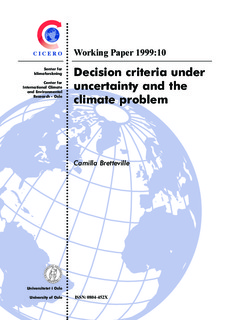Decision criteria under uncertainty and the climate problem
Working paper
Permanent lenke
http://hdl.handle.net/11250/192426Utgivelsesdato
1999Metadata
Vis full innførselSamlinger
- CICERO Working Papers [167]
Sammendrag
This working paper examines some of the decision criteria suggested by theories on decision making under uncertainty. This is done by applying the criteria to the problem of global warming. It is shown that even if there was a benevolent planner who is both supranational and supragenerational, and even if he had a well-defined intergenerational welfare function, there are still remaining problems. The question asked is: If there were a benevolent planner, would he know the best climate policy for the world today?
The main discussion abstracts from all other complications and focus on the lack of certainty regarding impacts of greenhouse gas emissions and the effectiveness of policy. A very simplified example of a game against nature is constructed. It has two possible policy choices: One can either try to prevent global warming, or one can choose to do nothing. The future state of the world is uncertain, and the chosen policy might affect the outcome in each state. The framing of the example is such that one should expect a policy of action to be preferred, rather than a no-action policy, however this is not always the case. It is shown that the preferred policy choice is very much dependent on the choice of decision criterion, the magnitude of costs and of the framing.
